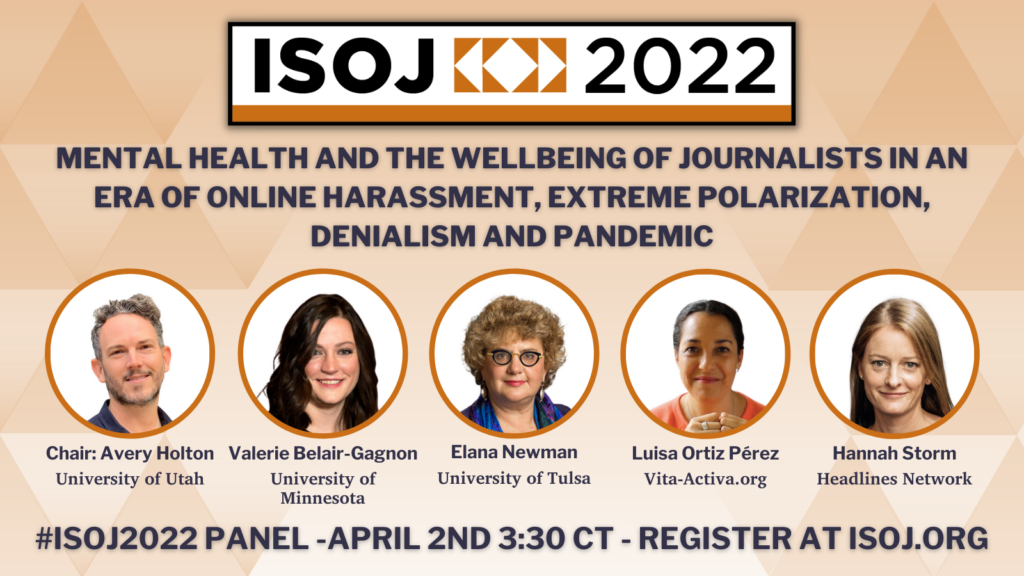February 28, 2022 | ISOJ2022, Mental Health
Mental health and wellbeing of journalists take center stage for panel discussion at ISOJ
The COVID-19 pandemic and social crises around the world have brought an important and often overlooked aspect of journalists’ lives to the forefront: mental health and wellbeing.
The psychological and emotional impacts of dealing with the pandemic were the most difficult aspect of work for found that 70 percent of respondents of the global survey “Journalism and the pandemic: A global snapshot of impacts,”published by the International Center for Journalists and the Tow Center for Digital Journalism.
During the 23rd International Symposium on Online Journalism (ISOJ), a group of expert panelists will come together to discuss working as a journalist in this context, as well as other factors affecting mental health and wellbeing of the press.
The panel “Mental health and the wellbeing of journalists in an era of online harassment, extreme polarization, denialism and pandemic” will be held on April 2 at 3:30 p.m. U.S. Central Time.

“Journalists across the globe are experiencing heightened anxiety, stress, and burnout related to a profession that increasingly demands more from them without providing adequate support for their mental health and well-being,” said Avery Holton, panel chair. “As more journalists and scholars take up the call to bear witness to journalists’ overall health, news organizations and the institution of journalism must do the same and find stronger pathways of sustained and actionable support.”
Panelists include:
- Avery Holton is associate professor and chair of the Department of Communication at the University of Utah. His research, appearing in more than 80 journal articles and book chapters, engages digital and social media, news and information, and constructs of health, identity, ability and wellness.
- Valerie Belair-Gagnon is an assistant professor at the Hubbard School of Journalism and Mass Communication and director of the Minnesota Journalism Center. One of her research interests is journalist well-being.
- Elana Newman is McFarlin Professor of Psychology at the University of Tulsa, research director of the Dart Center for Journalism and Trauma, and co-director of The University of Tulsa Institute of Trauma, Adversity and Injustice. She is a journalist ally and PTSD expert.
- Luisa Ortiz Pérez is executive director and co-founder of Vita-Activa.org, a helpline to assist women and LGBTIQ+ journalists, activists and freedom of expression defenders. She is a mental health advocate, gender-equality champion, civic media expert, social design tinker and non-violence expert.
- Hannah Storm is founder and co-director of Headlines Network, a community set up to promote more open conversations around mental health in the media. She is a media consultant specializing in journalism safety, crisis management and effective, empathetic leadership.
ISOJ will take place virtually and in person this year, with a range of prices that will allow for as large a group as possible to participate. Register is now open, so reserve your spot today.
You can also view the conference program to see who else will be presenting and speaking at this unique global symposium.
ISOJ, which began in 1999, brings together journalists, media executives, scholars and students to discuss the impact of technology on journalism today and in the future. It is an innovative conference that bridges the gap between the news industry and academia. View video and coverage of past ISOJ conferences at isoj.org.
For updates and additional information pertaining to ISOJ 2022, you can head over to ISOJ’s website, Twitter, Facebook, and LinkedIn. If you have any questions, please contact us at isoj@austin.utexas.edu.
And, don’t forget to register to join us online or in person. We have a range of pricing options so you can attend and participate in the way that best suits your needs and schedule. We look forward to seeing you, whether through a screen or in person!

